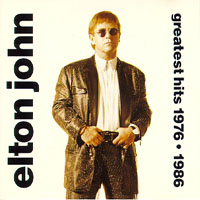 Elton John Who'd have thought that Elton John would turn out to be perhaps the most consistent performer of the past 30 years, an artist whose prolific output (seldom a year goes by without a new Elton album) is amazingly free of truly bad releases. Oh, don't get me wrong, he's had his share of utter shit—Leather Jackets springs immediately to mind, to say nothing of the hideous Victim of Love, which I make fun of so much I'm bound to start actually liking it at some point. But given that he's released over 40 albums over the past three decades, he's got a surprisingly good track record. Strangely, he's not one of those artists who has "down periods"—meaning, years where he's wayward and unfocussed (for example, 1981-1984 Alice Cooper, or for that matter, 1981-1984 anybody). Rather, he's got a weird knack for having a brilliant album followed by a piece of crap (Captain Fantastic followed immediately by Rock of the Westies) or vice versa (Leather Jackets followed by Live in Australia). And while he doesn't have real "down periods" be definitely has "up periods," and Greatest Hits 1976-1986 attests to the brilliance of his mid-career, post-Captain Fantastic and pre-Live in Australia, the phase past which he was a "Rock Star" but before he was an "Adult Contemporary Artist." This collection replaces the 1987 Greatest Hits Vol. 3, adding key tracks left off that one and omitting two "hits" ("Heartache All Over the World" and "Too Low For Zero," no huge loss on either, because they weren't really hits). The 13 tracks on Greatest Hits 1976-1986 are all bona fide hits, but more importantly they're pretty much all kick-ass songs, from the Elton anthem "I'm Still Standing" to the ubiquious "Sorry Seems to Be the Hardest Word" (I think it appears on every Elton John release now) and "I Guess That's Why They Call it the Blues." Those who relate these songs to painful memories of early-mid-80s Top 40 radio are directed to the underrated but equally sublime "Empty Garden (Hey Hey Johnny)" (easily one of the most neglected Elton classics), "Little Jeannie," and the always enjoyable "Don't Go Breaking My Heart." The flow is fantastic and makes second-tier tracks like "Who Wears These Shoes?" and "Wrap Her Up" very enjoyable, and in fact I never even skip over them. I'm one of those people who insists that David Bowie's "Let's Dance" and "Modern Love" era (dismissed even by Bowie as his "sell-out" period) produced a lot of his most genuinely enjoyable music (much as I like some of the "classic" albums, you can't deny how cold and pretentious they can get). What I like about Elton is his whole career has been one big sell-out, which ironically gives him probably the most credibility of any major superstar. When Paul McCartney or Rod Stewart want to cash in, you know it ("Spies Like Us?" "All For Love?"), but there's a sincerity to Elton John that transcends even his most misguided or pandering moments (mostly his '90s work, which is sappy but always listenable). The '80s period found him on a new plateau with his career, though, and it's the strength of the songs that carried him through. "Sad Songs," "Kiss the Bride," "Nikita"—quintessential 80s songs yet not really shackled to the era like, say, Big Country or Flock of Seagulls. Elton makes good pop, and sometimes achieves more in the process. I'd say this Greatest Hits collection is vastly more enjoyable than the previous two volumes, which are from Elton's more widely acknowledged "hit" period. Or maybe everyone likes the Elton period during which they grew up, making me partial to the 80s stuff even as I love the 70s albums as albums. For singles, I love 80s Elton, just as critics 15 years from now will look at The Lion King as their formative Elton album, and critics 50 years from now will look at the 80 Years in Showbiz compilation as the ultimate Elton anthology (this is slated to be released in 2049 to commemorate Elton's successful head transplant onto the body of a robot, allowing him to continue cranking out pop for every generation well into the 36th century, when our planet is slated to be destroyed by an asteroid shower after a failed attempt by the robot-body/human head Bruce Willis to deflect the rocks with a laser-equipped spaceship, ironically, one month after the release of Willis's album Asteroid Rock: Respect Yourself 35'53).
Review by Ashtabula Annie |